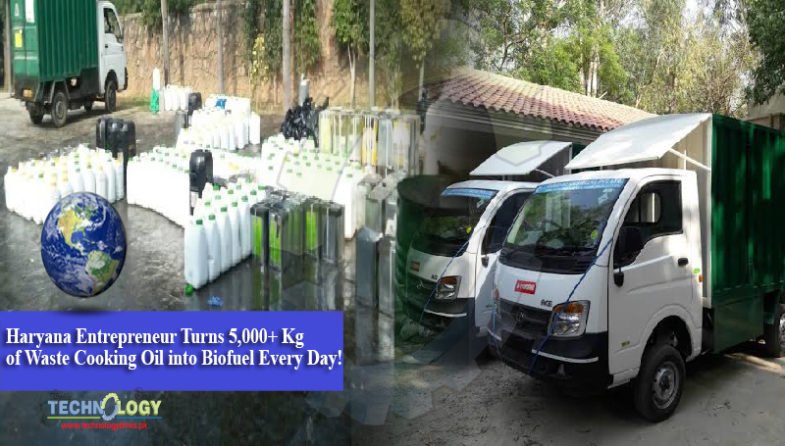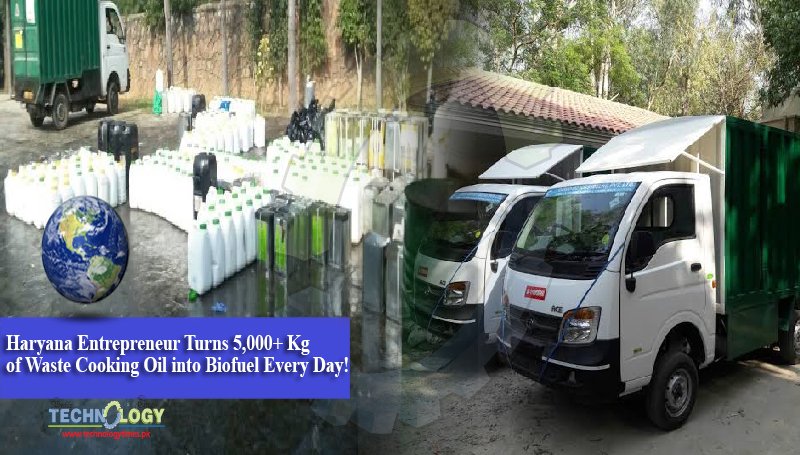Three liquid-carrying tanker trucks stand outside a popular food chain outlet in Bawal, Haryana. They are here to collect the used cooking oil from the outlet that offers a wide range of fried food items. After using the oil twice, the restaurant is left with only one choice—to dispose of it. The high-quality oil finds two methods of getting disposed off, either getting dumped into a water body or sold off at a cheap rate to roadside eateries that reuse it multiple times until it becomes a health hazard.

But these trucks, with the name “Bio-D Energy” printed on them, are here to serve an alternate purpose to the used cooking oil. They are here to transport hundreds of litres of this oil to a factory that will turn it into fuel for automobiles.
Started in 2015, Bio-D energy is a venture that produces biofuel from used cooking oil, serving a three-way purpose. “Through this initiative, we are preventing the adulteration of oil which is bought by big food chains and reused several times over by smaller restaurants.
But at the same time, we are also preventing the contamination of water, reducing the import of fossil fuels and reducing vehicular pollution,” Shiva Vig, the founder of the organisation, tells The Better India (TBI).
It was back in 2012 that Shiva, who belongs to a business family, came across this eco-friendly method of fuelling vehicles. He was in Dubai at the time, having just finished his college and helping his father in their paper importing business. Seeing that the world is becoming increasingly digital and that recycled paper is fast replacing virgin paper, Shiva was looking at a bleak future for the family business. He started looking at ways to recycle paper and if the market is open for this variety.
As one thing led to another, he came across a company that imported cooking oil from Dubai and turned it into fuel. This got Shiva’s brain gears moving. He studied the potential of this initiative.
And finally decided to start his venture in India.
“I wanted to help resolve several problems at one time—from waste management to air pollution—and this venture seemed to be an excellent start for this,” he adds.
The burden of consuming fossil fuels
Third in the world in oil consumption, India imported about 195 million tons of crude oil and 23.3 million tons of refined petroleum products in 2015. The following year, our oil consumption grew by 8.3 per cent, marking the country’s oil consumption to 212.7 million tonnes.
Vandana Hari, the founder of a Singapore based company that provides intelligence on global energy markets, tells the Economic Times, “India could very well be the biggest contributor of incremental oil demand growth for the next few years, led by its strong economic growth. It could overtake China as the country adding the most to global oil demand in absolute terms despite a much smaller base because, just as India’s consumption is rising strongly, Chinese demand is cooling off.”
One need not be reminded of how heavily fossil fuels cost us in terms of economics and the environment. And even as the world is gathering pace in innovating vehicles and other devices that use renewable energy instead of fossil fuels, we still have a long way to go in replacing most of our modern machinery with eco-friendly alternatives. Whether in terms of speed, efficiency or reliability, green machinery is still work-in-progress, and until we achieve complete mastery, one needs to think of ways to reduce our carbon footprint with the resources available currently.
Bio-D energy is one such example.
“The fuel produced from used cooking oil is low on sulphur and emits next to zero carbon. Since it doesn’t need extra resources to be extracted, it lowers our carbon footprint by 70-75 per cent,” Vig tells TBI.
“Currently, we buy about 5,000-6,000 kg of used oil daily and have obtained a 95 per cent efficiency in converting it into biofuel. You can imagine the number of imports that can be reduced if this model is expanded further.”
How fuel is extracted from edible oil
Conventional biofuel is manufactured using a process called transesterification where a fatty acid (glyceride) reacts with methanol or ethanol in the presence of a catalyst. The raw materials used in transesterification are vegetable oils, animal fats or cooking oil and the end products are methyl esters (used as biofuel) and glycerin.
Bio-D buys used cooking oil from food chains like Burger King, McDonald’s, KFC and about 1,000 other restaurants across the National Capital Region (NCR) at around Rs 25 per kg. In 2016, KFC became their first partner, and in the following years, Bio-D’s base saw an exponential expansion.
“We imported machinery from Korea and modified its technology in India to make the process as efficient as we could. We can convert 150 tonnes of biofuel every day. Currently, we are looking for buyers for the glycerin, but our biofuel is bought by Bharat Petroleum, Hindustan Petroleum as well as by some rural petrol pumps in Haryana, Punjab, Rajasthan, Uttar Pradesh, among others,” the third generation entrepreneur informs TBI.
And although many Indian organisations manufacture biodiesel, Bio-D ensures a quality unmatched by the rest.
Prasan Surana, the Founder of Synergy Teletech, confirmed the quality of fuel produced by Bio-D, and told Your Story, “Bio-D energy distributes pure and distilled bio-fuel to us that we sell to our end-users at Rs 5 less than the market price of diesel. Office complexes, residential colonies, and other manufacturing units are a part of the consumer base.”
The social and environmental impact of the 200 employee-large-enterprise has been evident in the energy market. Earlier this year, the Food Safety and Standards Authority of India (FSSAI) also awarded them as an authorised aggregator for its ‘Repurpose Used Cooking Oil’ Initiative.
A revolution, especially against pollution and exploitation of energy sources, has to be fought in multiple directions. Bio-D’s manufacturing of biofuel is one such amazing venture that is saving the import of thousands of kilograms of fossil fuel.
